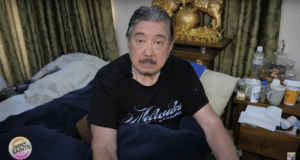There is no question that Janette Garin is at the epicenter of the dengue medical crisis. She was health secretary when the vaccine was launched, and presided over the decision to purchase and disseminate it in three regions of the Philippines (NCR, III, and IV-A), later extended to Cebu. And she rode roughshod over any and all rational opposition.
The Reader may remember that she was health undersecretary, but reportedly engineered the downfall of her boss, Secretary Enrique Ona (who was later cleared of all charges, ironically involving the purchase of another vaccine), so she could succeed him. She was also the one who visited soldiers while they were quarantined on Carballo Island with the suspected Ebola virus. Why quarantine them at all, if the quarantine was so easily broken by publicity-seeking officials?
Ms Garin is now an adviser of Speaker Pantaleon Alvarez, and has, in an effort to escape responsibility, laid the blame for the vaccine mess on her then boss, then President Benigno Aquino III. According to reports, she claimed that Aquino was the one who negotiated with Sanofi Pasteur, the producer of the vaccine, in December 2015, and was the one who decided to go ahead with the immunization program.
To say that P-Noy was the one who wanted the vaccines is to completely marginalize the Department of Health’s role in public health issues, and to portray it as a puppet of the political process. But because this administration seems so anxious to pin something on P-Noy, Ms Garin’s claim was getting traction—until a leaked Department of Foreign Affairs document showed that she met with Sanofi in Paris, in May 2015, or seven months before P-Noy’s supposed negotiations.
Worse, the DFA document, a report by our Philippine ambassador to France, belied Ms Garin’s categorical statement — in a TV interview earlier this year — that she never met with Sanofi officials while she was in Paris in 2015. Remember the Trillanes conversation with Chinese officials recorded by our ambassador to China? This is exactly the same thing. The DFA officials abroad take copious notes and send them back to Manila.
Ms Garin, according to the report, met with Sanofi’s vice president in charge of the dengue vaccine program, Sanofi’s senior director for vaccination policy and advocacy, and, even more noteworthy, Sanofi’s country manager in the Philippines, a Ching Santos. The report fully detailed the conversation that took place, including a promise by Sanofi to finalize a cost/pricing proposal for the Philippines by June 2015.
Think of it, Reader. Ms Garin was making a deal with Sanofi way ahead of the Food and Drug Administration’s licensing of Dengvaxia in the Philippines (done in December 2015), and way ahead of its inclusion in the National Formulary, a list of medicines which government agencies can buy (done sometime in February 2016). And ahead of any inclusion in the government budget. This goes completely against all government processes; Susie Mercado, who was undersecretary under then Health Secretary Juan Flavier, and a former World Health Organization regional official, said so during an interview in my “Bawal ang Pasaway” TV program which will be shown on Monday evening.
The WHO also saw fit to belie Ms Garin’s claim that it recommended that the Philippines undertake the vaccination program. The WHO said it never recommends to a sovereign country and merely issues expert guidelines that these countries may consider. Moreover, the WHO pointed out that Ms Garin launched the vaccination program on April 4, 2016, and the WHO’s preliminary report on the subject came out two weeks later, with the final report out in July 2016. That’s the second time Ms Garin has been caught lying.
Yet another lie has come out, but I don’t know whether it is attributable to Ms Garin’s DOH or to the present DOH: The claim is that in those areas with the vaccination program, only 8-10 percent had no previous dengue infection. That claim is based on data in the two towns where clinical trials were held. No way can it be extrapolated to three regions. And the DOH knows this.
Please, DOH. Don’t try to minimize the risks in this way. Your reputation is already in tatters. And children’s lives are at stake.


